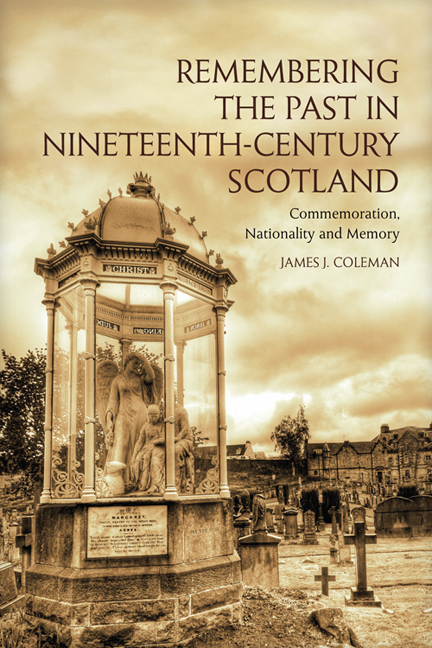Book contents
- Frontmatter
- Contents
- Acknowledgements
- Introduction: The Valley Cemetery
- 1 Nationality, Memory and Commemoration
- 2 Scottish Nationality in the Nineteenth Century
- 3 ‘Not Servile and Conquered, but Free and Independent’: Commemorating William Wallace and Robert the Bruce
- 4 ‘The Highest Position in the Civilised World’: Commemorating John Knox and the Second Reformation
- 5 ‘If They Were Rebels Then, We Are Rebels Now’: Commemorating the Covenanters and the Glorious Revolution
- 6 ‘By the Imprudence of His Ancestors’: Commemorating Jacobitism and Mary Queen of Scots
- 7 ‘Staunch Loyalty to the Flag that Stands for Union’
- Bibliography
- Index
5 - ‘If They Were Rebels Then, We Are Rebels Now’: Commemorating the Covenanters and the Glorious Revolution
Published online by Cambridge University Press: 05 August 2016
- Frontmatter
- Contents
- Acknowledgements
- Introduction: The Valley Cemetery
- 1 Nationality, Memory and Commemoration
- 2 Scottish Nationality in the Nineteenth Century
- 3 ‘Not Servile and Conquered, but Free and Independent’: Commemorating William Wallace and Robert the Bruce
- 4 ‘The Highest Position in the Civilised World’: Commemorating John Knox and the Second Reformation
- 5 ‘If They Were Rebels Then, We Are Rebels Now’: Commemorating the Covenanters and the Glorious Revolution
- 6 ‘By the Imprudence of His Ancestors’: Commemorating Jacobitism and Mary Queen of Scots
- 7 ‘Staunch Loyalty to the Flag that Stands for Union’
- Bibliography
- Index
Summary
THE COVENANTING MARTYRS
The commemoration of William Wallace, Robert Bruce and John Knox depicted these national heroes as the embodiment of Scottish nationality. For nineteenth-century Scots, this nationality was an enduring truth, the expression of a collective sense of Scotland's past, defined by the leitmotif of civil and religious liberty. The nature of Scottish nationality was forcefully reiterated in the seventeenth century, as Charles I attempted to subvert the Scots’ hard-won liberty. The Glasgow and Westminster Assemblies were the response, Scottish Presbyterians uniting against the tyrant to defend their faith and their nation. Memories of this Presbyterian national heroism fed into a nineteenth-century sense of independent Scottish nationhood and a heroism that ensured a union of equals with England, a union that protected – and did not undermine – Scottish nationality.
This chapter considers the commemoration of the later stage of the Covenanting era, between the Restoration of the Stuart monarchy in 1660 through to the Glorious Revolution in 1688/9. In particular, we will focus on the Covenanter martyrs of the so-called ‘Killing Times’ of the 1680s. Following the imposition of episcopacy at the Restoration, over a quarter of Scottish Presbyterian ministers refused to conform, choosing instead to preach at illegal ‘conventicles’, concentrated mainly in the south-west of Scotland. In response, Charles II set out to suppress this rebellious activity and, as the level of persecution increased, it was a short step to armed revolt. The Covenanters’ victory at Drumclog and their subsequent defeat at Bothwell Bridge in 1679 ushered in a sustained period of intense persecution, including transportation or summary executions for the most unfortunate. Undaunted, these hard-line Presbyterians continued to gather illegally, becoming increasingly militant and militarised. The publication of the Cameronian Sanquhar Declaration in 1680, disavowing allegiance to the King, ushered in harsher responses from the state – anyone unwilling to swear the Abjuration Oath could be executed on the spot.
What distinguishes this later Covenanting period from the other milestones of Scottish nationality considered in the preceding chapters is the range of commemorative subjects available to draw from. Covenanting lore provided a rich variety of heroic examples, each with its own lively story to be told. They might be chief protagonists such as the preachers Richard Cameron or James Renwick, leading the struggle against the ungodly policies of the Stuarts with sword and open Bible.
- Type
- Chapter
- Information
- Remembering the Past in Nineteenth-Century ScotlandCommemoration, Nationality, and Memory, pp. 130 - 153Publisher: Edinburgh University PressPrint publication year: 2014



